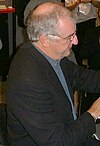Portal:BBC/Selected article
| This Wikipedia page has been superseded by Portal:BBC and is retained primarily for historical reference. |
| Note: Article entries are now being transcluded directly on the main portal page. However, this page should be retained for historical reference. |
The following articles are the selected articles displayed on the BBC Portal.
Selected article 1
The Power of Nightmares is a BBC documentary film series, written and produced by Adam Curtis. The series consists of three one-hour films, consisting mostly of a montage of archive footage with Curtis's narration, which were first broadcast in the United Kingdom in late 2004 and have been subsequently aired in multiple countries and shown in several film festivals, including the 2005 Cannes Film Festival. The films compare the rise of the American Neo-Conservative movement and the radical Islamist movement, making comparisons on their origins and noting strong similarities between the two. More controversially, it argues that the threat of radical Islamism as a massive, sinister organised force of destruction, specifically in the form of al-Qaeda, is in fact a myth perpetrated by politicians in many countries—and particularly American Neo-Conservatives—in an attempt to unite and inspire their people following the failure of earlier, more utopian ideologies. The Power of Nightmares has been praised by film critics in both Britain and the United States. Its message and content have also been the subject of various critiques and criticisms from conservatives and progressives.
Selected article 2
Portal:BBC/Selected article/2 The Quatermass Experiment is a British science-fiction serial, broadcast by BBC Television in the summer of 1953, and re-staged by BBC Four in 2005. Set in the near future against the background of a British space programme, it tells the story of the first manned flight into space, overseen by Professor Bernard Quatermass of the British Experimental Rocket Group. When the spaceship that carried the first successful crew returns to Earth, two of the three astronauts are missing, and the third is behaving strangely. It becomes clear that an alien presence entered the ship during its flight, and Quatermass and his associates must prevent the alien from destroying the world. Originally comprising six half-hour episodes, it was the first science-fiction production to be written especially for an adult television audience. The serial was the first of four Quatermass productions to be screened on British television between 1953 and 1979. As well as spawning various remakes and sequels, The Quatermass Experiment inspired much of the television science fiction that followed it, particularly in the United Kingdom, where it influenced successful series such as Doctor Who and Sapphire and Steel. It also influenced Hollywood blockbusters such as 2001: A Space Odyssey and Alien.
Selected article 3
Douglas Adams was a cult British comic radio dramatist, musician and author, most notably of The Hitchhiker's Guide to the Galaxy series. Hitchhiker's began on radio and developed into a "trilogy" of five books (which had sold more than fifteen million copies by the time of Adams's death) as well as a television series, a computer game and a feature film that was completed only after Adams's death. In addition, Douglas Adams also wrote or co-wrote three stories of science fiction staple Doctor Who and served the series as Script Editor during the seventeenth season. His other written works include the Dirk Gently novels, co-author credits on two Liff books and Last Chance to See, which was also based on a radio series. Towards the end of his life, he was a sought-after lecturer on topics including technology and the environment. Since his death at the age of 49, he is still widely revered in science fiction and fantasy circles.
Selected article 4
The TARDIS (Time And Relative Dimension(s) In Space) is a fictional time machine and spacecraft in the BBC science fiction television programme Doctor Who. A product of Time Lord technology, a properly piloted and working TARDIS is capable of transporting its occupants to any point in space and time. Its interior exists in multidimensional space, leading to it being significantly larger on the inside than it appears from outside. Externally, the TARDIS resembles the shape of a 1950s British police box, and the programme has become so much a part of British popular culture that the shape of the police box is now more immediately associated with the TARDIS than its original real-world function. The word has also entered popular usage and is used to describe anything that seems bigger on the inside than on the outside.
Selected article 5
Portal:BBC/Selected article/5 Only Fools and Horses is a British television sitcom, created and written by John Sullivan, and made and broadcast by the BBC in the United Kingdom between 1981 and 2003. After a relatively slow start the show went on to achieve consistently high ratings, and the 1996 episode "Time On Our Hands" holds the record for the highest UK audience for a sitcom episode. Set in the Inner London district of Peckham, it stars David Jason as ambitious market trader Derek "Del Boy" Trotter, Nicholas Lyndhurst as his younger brother Rodney, and Lennard Pearce as their ageing grandfather (later replaced by Buster Merryfield as their Uncle Albert). Backed by a strong supporting cast, it chronicled their highs and lows in life, particularly their attempts to get rich. Critically and popularly acclaimed, the series received numerous awards, including recognition from the British Academy, the National Television Awards and the Royal Television Society, as well as helping both Sullivan and Jason win individual accolades. It also had an impact on British culture, contributing several words to the English language and helping to popularise the Reliant Regal van.
Selected article 6
Portal:BBC/Selected article/6 The BBC Young Musician of the Year is a televised music competition, broadcast on BBC Two and BBC Four biennially, and hosted by the BBC. The competition is designed for British percussion, keyboard, string, brass and woodwind players, all of whom must be eighteen years of age or under. The competition was established in 1978 by Humphrey Burton and Walter Todds, both of whom are former members of the BBC Television Music Department. In 1994, the usage of percussion instruments were permitted, alongside the existing keyboard, string, brass and woodwind categories, and is still permitted for use nowadays. Since its introduction, the allowance of percussion instruments has increased interest in the competition among young people. Currently, the competition has five stages, which consist of regional auditions, regional finals, quarter-finals, semi-finals and the final. As a result of the success of the competition, the Eurovision Young Musicians competition was initiated in 1982.
Selected article 7
Portal:BBC/Selected article/7 Yes Minister is a multi-award winning satirical British sitcom written by Antony Jay and Jonathan Lynn that was first transmitted by BBC television and radio between 1980 and 1984. Along with the sequel, Yes, Prime Minister, which ran from 1986 to 1988, 38 episodes were made. Set in the private office in Whitehall of a British government cabinet minister (and, in the sequel, in 10 Downing Street), the series follows the ministerial career of Jim Hacker MP, played by Paul Eddington. His various struggles to formulate and enact legislation or effect departmental changes are opposed by the will of the British Civil Service, in particular his Permanent Secretary, Sir Humphrey Appleby, played by Nigel Hawthorne. His Principal Private Secretary Bernard Woolley, played by Derek Fowlds, is usually caught between the two, although heavily influenced by Sir Humphrey. Almost every programme ends with the line "Yes, Minister" (or "Yes, Prime Minister"), uttered (usually) by Sir Humphrey as he quietly relishes his victory over his "political master" (or, occasionally, acknowledges defeat). A huge critical and popular success, the series received a number of awards; including several BAFTAs and in 2004 came sixth in the Britain's Best Sitcom poll. It was the favourite television programme of the then British Prime Minister, Margaret Thatcher.
Selected article 8
Portal:BBC/Selected article/8 Last of the Summer Wine is a British sitcom written by Roy Clarke that first aired on BBC One. It premièred as an episode of Comedy Playhouse on 4 January 1973, and the first series of episodes followed on 12 November 1973. The 31st and final series was broadcast in 2010, making it the longest-running comedy programme in Britain and the longest-running sitcom in the world. The series is set and filmed in and around Holmfirth, West Yorkshire, and centres around a trio of old men, originally Bill Owen, Peter Sallis and Michael Bates, and since has included Brian Wilde, Michael Aldridge, Frank Thornton, and Brian Murphy. The men never seem to grow up, and develop a unique perspective on their equally eccentric fellow townspeople through their youthful stunts. The cast has grown to include a variety of supporting characters, each contributing their own subplots to the show and often becoming unwillingly involved in the schemes of the trio. The series continues to garner a large audience for the BBC and has been praised for its positive portrayal of older people and family-friendly humour. The show won the National Television Award for Most Popular Comedy Programme in 1999, and many holiday specials, two television films, a documentary film, novelisations, and a stage adaptation about the series have been made.
Selected article 9
Joking Apart is a BBC television sitcom written by Steven Moffat about the rise and fall of a relationship. It juxtaposes a couple, Mark (Robert Bathurst) and Becky (Fiona Gillies), who meet and fall in love before getting separated and finally divorced. The twelve episodes, broadcast between 1993 and 1995, were directed by Bob Spiers and produced by Andre Ptaszynski for independent production company Pola Jones. The show is semi-autobiographical; it was inspired by the then-recent separation of Moffat and his first wife. Some of the episodes in the first series followed a non-linear parallel structure, contrasting the rise of the relationship with the fall. Other episodes were ensemble farces, predominantly including the couple's friends Robert (Paul Raffield) and Tracy (Tracie Bennett). Paul-Mark Elliott also appeared as Trevor, Becky's lover. Scheduling problems meant that the show attracted low viewing figures. However, it scored highly on the Appreciation Index and accrued a loyal fanbase. One fan acquired the home video rights from the BBC and released both series on his own DVD label.
Selected article 10
Portal:BBC/Selected article/10
The BBC Sports Personality of the Year is an awards ceremony that takes place annually in December. Devised by Paul Fox in 1954, it originally consisted of one titular award (2008 winner, Chris Hoy, pictured). Several new awards have been introduced, and as of 2008[update], eight awards are presented. The oldest of these are the Team of the Year and Overseas Personality awards, which were introduced in 1960. The other awards are the Lifetime Achievement Award, the Helen Rollason Award, the Coach Award, Young Sports Personality of the Year, and the Unsung Hero Award. Other awards that have been presented in the past include the Special Achievement Award and the Sports Personality of the Century Award. The trophy for the main award is a silver-plated four-turret lens camera, and for the other awards smaller imitations of the main trophy are used. All of the BBC local regions hold their own independent award ceremonies, which take place before the main ceremony and are used to compile a shortlist for the BBC Sports Unsung Hero Award. The event was held outside London for the first time in 2006, when tickets were made available to the public.





